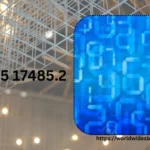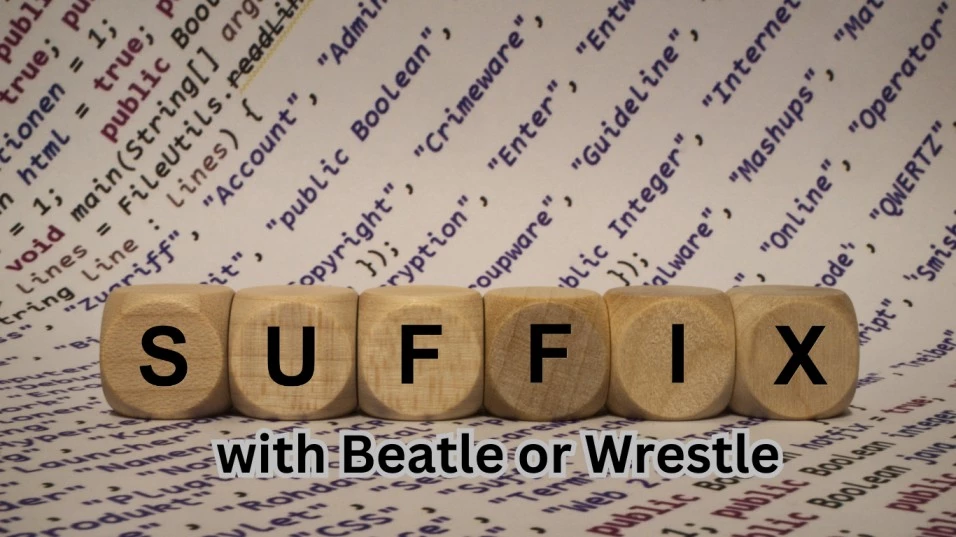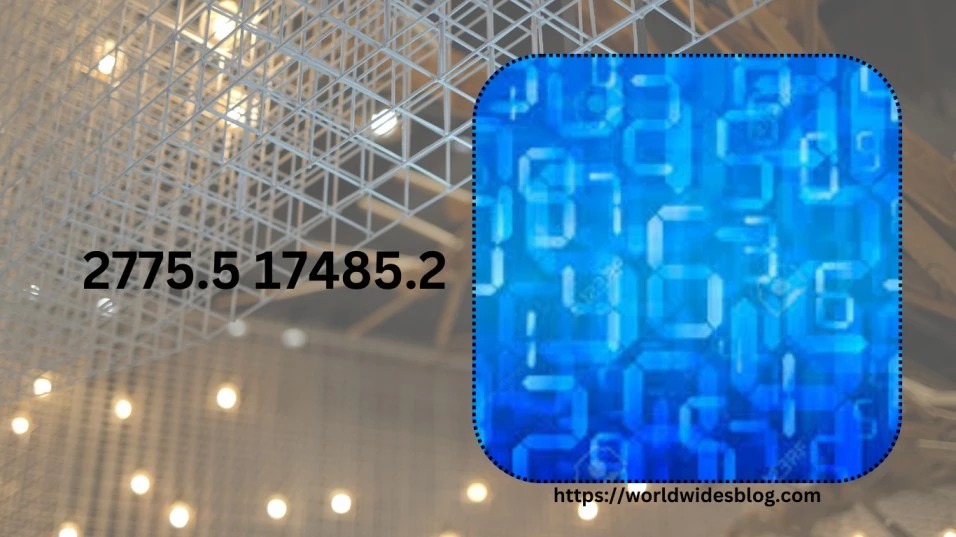Crossword puzzles are a favorite hobby for many people. They are both fun and challenging. One aspect that makes them so engaging is the variety of clues that can stump even the most experienced solvers. Among these are clues involving word suffixes, which can be tricky to decode. You’re not alone if you’ve encountered the crossword clue “suffix with Beatle or Wrestle” and found yourself scratching your head. This article will guide you through understanding and solving this type of clue step by step.
Understanding Crossword Clues
What are crossword clues?
Crossword clues help you find the correct words to complete the puzzle. They can be straightforward or cryptic, requiring different types of thinking to solve.
Types of crossword clues:
- Definitions: These clues directly describe the answer.
- Anagrams: These clues mix up the letters of a word or phrase to make a new word.
- Hidden Words: The answer is hidden within a longer word or phrase.
Importance of recognizing word suffixes in crossword clues
Recognizing suffixes in clues can be vital to solving them, as suffixes modify word meanings and can help you identify the correct answer. Understanding common suffixes makes it easier to decode tricky clues.
The Significance of Suffixes in Crossword Puzzles
What are suffixes?
Suffixes are letters or groups of letters added to the end of a word to change its meaning or grammatical function.
How suffixes influence word meaning
Suffixes can transform a word’s meaning, turning a verb into a noun (e.g., “run” to “runner”) or an adjective (e.g., “happy” to “happiness”) and altering how it fits into a sentence.
Common suffixes used in crossword puzzles
Common suffixes in crosswords include “-er,” “-ing,” “-ed,” “-ment,” and “-ly.” Recognizing these can help solvers identify and complete answers more efficiently.
Decoding the Clue: Suffix with Beatle or Wrestle
Let’s look at the clue suffix with Beatle or Wrestle. The clue says a typical ending can be added to “Beatle” and “Wrestle” to make new words. This type of clue requires not just knowledge of vocabulary but also understanding how suffixes can alter words.
The Crossword Solution Process
Step-by-step approach to solving crossword clues
- Read the clue carefully: Determine whether it’s straightforward or cryptic.
- Identify the type of clue: Look for definitions, anagrams, or other patterns.
- Fill in the obvious answers: Start with the clues you’re confident about.
- Use intersecting words: These can provide hints for more challenging clues.
- Consider the word length: Match the clue to the number of spaces available.
Tips and tricks for identifying suffixes
- Look for common endings: Suffixes like “-er,” “-ing,” or “-ness” are frequently used.
- Analyze the word structure: If the clue hints at a verb, consider adding “-ed” or “-ing.”
- Check for wordplay: Sometimes suffixes are hidden in puns or other wordplay.
Examples of similar crossword clues and solutions
- Clue: “Suffix for ‘sing’ or ‘dance'”
Solution: “er” (forming “singer” and “dancer”) - Clue: “Suffix with ‘hope’ or ‘dark'”
Solution: “ness” (forming “hopefulness” and “darkness”)
Exploring the Words “Beatle” and “Wrestle”
Historical context and meaning of “Beatle”
“Beatle” means a member of The Beatles, a famous British rock band that changed music in the 1960s. Beatlemania is the term for the wild excitement fans had for the band then.
Overview of the term “Wrestle”
“Wrestle” is a verb. It means to fight or struggle with someone. This usually happens by grabbing or holding them. It is often done in a sport or competition. It can also refer to working with a complex problem or situation.
How these words are used in different contexts
The word “Beatle” is often used when talking about culture or music, especially about the history of rock music. “Wrestle,” on the other hand, is commonly used in both literal and metaphorical contexts, whether describing a sport or someone grappling with a tough decision or challenge.
Possible Suffixes for “Beatle”
Common suffixes for “Beatle”
- “-mania”: Refers to the intense fan enthusiasm, forming “Beatlemania.”
- The suffix “-s” makes the word plural, so “Beatles” means all the band members together.
Possible word formations with “Beatle” suffixes
- Beatlemania: Describes the cultural phenomenon of extreme fan worship.
- Beatles: Refers to the band as a group.
Crossword puzzle examples
- Clue: Add a word ending to ‘Beatle’ to describe a fan craze.
Solution: “Mania” - Clue: “Plural suffix for the Fab Four.”
Solution: “s”
Possible Suffixes for “Wrestle”
Common suffixes for “Wrestle”
- “-er”: Forms a noun referring to someone who wrestles, as in “wrestler.”
- “-ing” changes the verb into a noun, like “wrestling.”
- “-ed”: Changes the verb to show it happened before, like “wrestled.”
Possible word formations with “Wrestle” suffixes
- Wrestler: Someone who participates in wrestling.
- Wrestling: Wrestling is a sport where you grab and hold your opponent.
- Wrestled: The action happened in the past.
Crossword puzzle examples
- Clue: “Suffix with wrestle to describe an athlete.”
Solution: “er” - Clue: Suffix that describes the action of wrestling
Solution: “ing”
Common Suffixes in Popular Crosswords
Frequently seen suffixes in major crossword puzzles
- “-er”: Used to form nouns indicating a person who acts (e.g., “writer,” “player”).
- “-ing”: Forms the gerund or present participle of verbs (e.g., “running,” “swimming”).
- “-ed”: It makes verbs into the past tense, like “played” and “walked.
- “-ly”: Converts adjectives into adverbs (e.g., “quickly,” “happily”).
- “-ment”: Changes verbs into nouns that show an action or result. For example, “development” or “agreement.”
Examples of clues and answers from famous crosswords
- Clue: “Suffix for ‘dance’ to describe an ongoing activity”
Solution: “ing” (forming “dancing”) - Clue: Add a word ending to “teach” to show it is a job.
Solution: “er” (forming “teacher”) - Clue: Add an ending to the word “teach” to show that it is a job.
Solution: “ness” (forming “happiness”)
The role of suffixes in making crossword puzzles challenging
Suffixes add complexity by requiring solvers to consider how words can be transformed or extended. They often involve recognizing patterns and meanings beyond the base words, making puzzles more intricate and engaging. Understanding and identifying common suffixes helps solvers decode clues more efficiently and enhances their crossword-solving skills.
Challenges in Decoding Suffix Clues
Common pitfalls when interpreting suffix clues
- Multiple Suffix Options: A single clue might fit multiple suffixes, leading to confusion. For example, “dance” could be followed by “ing” or “er,” each forming a different word.
- Ambiguous Clues: Some clues need to be more specific or clear, making it hard to determine the correct suffix.
- Overlap with Other Words: Similar suffixes can lead to multiple potential answers, especially if intersecting words don’t fit well.
How to avoid confusion between similar suffixes
- Contextual Analysis: Consider the context of the clue and the crossword grid. Sometimes, the length of the word or intersecting answers can provide hints.
- Common Usage: Familiarize yourself with common suffixes and their typical usage to quickly identify the right one.
- Cross-Check Answers: Verify your answers against other clues in the puzzle to ensure they fit the overall solution.
Examples of tricky suffix clues
- Clue: Add ‘paint’ to describe a finished work.
Solution: “ed” (forming “painted”)
Trick: The word “painted” can also be confused with “painting” (suffix “ing”). - Clue: Add ‘read’ to the end for a word about someone who does it.
Solution: “er” (forming “reader”)
Trick: The suffix “ing” (forming “reading”) might also seem plausible, depending on the clue context. - Clue: Add a suffix to ‘happy’ to show how someone feels.
Solution: “ness” (forming “happiness”)
Trick: Similar suffixes like “ly” (forming “happily”) could be a misleading option.
How to Improve Your Crossword Solving Skills
Practice strategies for recognizing suffixes
- Study Common Suffixes: Familiarize yourself with frequently used suffixes and their meanings. Make a list. Check it often.
- Solve Puzzles Regularly: Practice with various puzzles to see suffixes in action and understand their usage in other contexts.
- Use Word Lists: Look up lists of common suffixes and their example words to reinforce your recognition skills.
Resources for improving your crossword skills
- Crossword Puzzle Books: Books with varying difficulty levels can help you practice and expose you to clues and suffixes.
- Online Crossword Tools: Websites and apps often have solver tools and crossword databases to help you learn and practice.
- Crossword Forums and Communities: Engaging with other crossword enthusiasts online can provide tips, strategies, and insights.
How to learn from crossword puzzle mistakes
- Review Solutions: After completing a puzzle, check the solutions and understand any mistakes you made. Analyze why a particular suffix or answer was correct.
- Take Notes: Keep a journal of challenging clues and suffixes you find difficult. Review these notes to improve over time.
- Ask for Help: Discuss tricky puzzles with friends or online communities to get different perspectives and explanations.
These strategies can help you get better at solving crosswords. They make it easier to tackle challenging puzzles.
Advanced Techniques for Solving Crossword Clues
Techniques like pattern recognition and grid analysis can be helpful for more advanced crossword solvers. Look at the surrounding words in the puzzle grid for hints on possible suffixes, and consider the overall theme of the puzzle, which might provide additional context.
The Role of Wordplay in Crossword Puzzles
Wordplay in crossword puzzles involves clever and creative use of language to craft clues that challenge solvers to think outside the box. It can include various techniques:
- Puns: Clues may use puns or double meanings to hint at the answer. For example, a clue like “Cold snack?” It could mean “ice cream.” This is because “ice” is cold.
- Homophones: Clues might use words that sound like other words to lead to the answer. For instance, “Hear” for “here” could be a clue for “location.”
- Anagrams: Rearranging letters of a word or phrase to form the answer. A clue like “Rearrange ‘silent’” might lead to “listen.”
- Charades: Clues may be descriptive and require you to “act out” the answer mentally. For example, “Larger than life (8)” could hint at “heroic.”
- Cryptic Definitions: These clues might describe the answer in a roundabout or indirect way, requiring some lateral thinking.
Wordplay adds a layer of complexity and enjoyment to crossword puzzles, making them more engaging and thought-provoking. Recognizing and mastering these techniques can significantly enhance your problem-solving skills.
Crossword Puzzles as a Brain Exercise
Aside from being a fun pastime, solving crossword puzzles is also an excellent exercise for your brain. It enhances your vocabulary, improves problem-solving skills, and provides a sense of accomplishment when you finally crack a challenging clue. So, next time you encounter a tough suffix clue, remember that you’re also giving your brain a workout.
Conclusion
Understanding and decoding suffix clues in crossword puzzles can be a rewarding challenge. The clue “suffix with Beatle or Wrestle” is just one example of how suffixes can create engaging and thought-provoking puzzles. By familiarizing yourself with common suffixes and practicing regularly, you’ll become more adept at solving these clues and enjoying the process.
FAQs About Suffix with Beatle or Wrestle
What is a crossword clue with a suffix?
- A crossword clue with a suffix involves a hint that suggests adding a particular suffix to a base word to form the correct answer.
How do I solve crossword clues with suffixes?
- To solve these clues, identify the base word, consider possible suffixes, and test them against the given letters and intersecting words in the puzzle.
Why are suffixes essential in crossword puzzles?
- Suffix with Beatle or Wrestle are essential because they change the meaning or function of a word, creating new answers that fit the clue’s requirements.
What are some common suffixes used in crosswords?
- Common suffixes in crosswords include “-er,” “-ing,” “-ed,” and “-ment,” among others.
Can suffixes change the meaning of words in crossword puzzles?
- Yes, adding a suffix to a word can significantly change its meaning, so recognizing the correct suffix is crucial for solving these clues.











